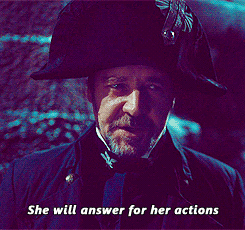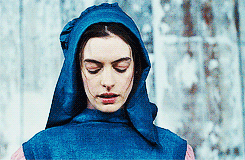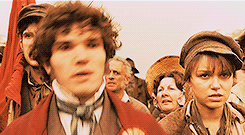It is eleven o’clock on a Friday night and your mascara-tinged tears are drying on your cheeks.
Continuing your trend of being the girl who blogs in second person about the intricacies of musical theatre and social justice, you have just come out of the evening performance of Les Misérables on Broadway. Les Mis has been important to you for years; it’s your favorite book (you’ve read the unabridged version four times through), you love the movie (except for Russell Crowe), and you’ve seen a regional production. You have done research on the book and its fan culture for class credit. The characters are imprinted on your heart and under your skin.
With forty-eight hours to process the show, you have begun thinking about its relevancy. There is a reason that the show was revived when it was, and you think about its political implications in a headspace that is much more comfortable than the one you occupied post-Waitress. Les Misérables was important when it was written, and its number of adaptations testifies that it has continued to be important right up until the present day. Por quoi? you might ask. You can make connections to nearly every topic that the Moxies have discussed in seminar. You can see the social structures that existed then carrying over into now, continuing to make places like family justice centers necessary.

Inspector Javert.
The first tableau you see onstage is a group of law enforcement, standing over prisoners doing hard, unethical labor for little-to-no pay, and cracking a whip when one of them falters. Throughout the entire show, we see Inspector Javert doggedly attached to his idea of the law, genuinely believing that he’s a righteous man for the oppressive work he does. It feels like a synthesis of this week’s news, albeit with a racial slant as opposed to Les Mis’s class struggles (though, in the United States, those are intricately tied together).

Fantine in her work attire.
The next scene, the audience is presented with a factory, utilizing cheap feminine labor (a topic you have discussed in Moxie seminars) to sew. The women who work in the factory are subject to sexual harrassment and violence by their foreman. We are here introduced to Fantine, whose story follows an arc that can easily be discussed in terms of reproductive justice rhetoric; the father of her child abandoned the two of them, forcing her to leave her daughter with an innkeeper and work under false pretenses to send money to care for her. Once this is discovered, she is fired quickly and mercilessly, thus bringing in the conversation of worker’s rights, particularly for more vulnerable populations. Fantine is forced to turn to sex work to provide to her child, and ultimately dies of tuberculosis that she got while working the docks. She does not have the safety and autonomy to parent her own child, whom she loves dearly. And not everyone has a Jean Valjean to save their child and give them a wonderful life.

Late in the first act, spectators are presented with Les Amis de l’ABC, a militant student activist group dedicated to advocating for the rights of the people. You cannot help but consider the Moxie conversations of youth, empowerment, and radicalization as you watch them plan and erect their barricade. You are particularly attached to Les Amis and expect to cry when they ultimately meet their deaths, but you think this time it may have been enhanced by realizing fully that this still happens. You find yourself having far more emotions than usual around the children in the show (young Cosette, young Éponine, and the street urchin Gavroche), all of whom face many of the same issues as the children that you work with at the BxFJC; housing instability, food instability, lack of social support, and sometimes even abuse.
Throughout the whole show, though, are chords of radical love and intense compassion of every sort. A mother’s love for her child, a father’s love for his adopted daughter. Romantic love between two people, platonic love between two people, love between a group of friends, love for a cause and a country and a people. One of the last lines in the show that always wrenches tears from you, sung in gentle, delicate harmony, is as follows: “To love another person is to see the face of God.”
Theatre, as you have said time and time again, can be social justice elevated to art. Some do it clumsily, yes, but some weave together a gorgeous, necessary show that dredges up important cultural narratives. You admit that you’re biased, but Broadway’s Les Misérables has certainly achieved the latter.
Also, you meet some of your favorite actors at the stage door, including (in order) Joseph Spieldenner (Grantaire), EJ Zimmerman (Éponine), and John Owen-Jones (Jean Valjean)!



